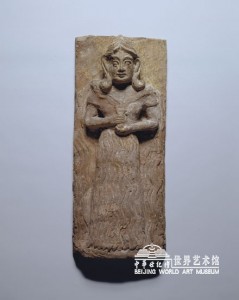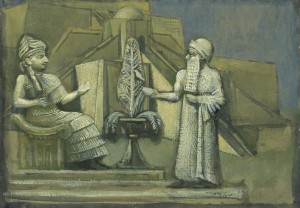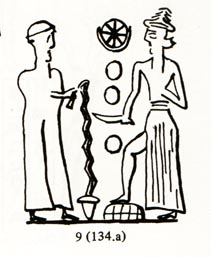http://www.realhistoryww.com/world_history/ancient/Misc/Sumer/ur_nammu_law.htm
CODE OF 57 LAWS INCLUDING CRIMINAL LAW, FAMILY LAW, INHERITANCE LAW, LABOUR LAW INCLUDING SLAVE RIGHTS, AND AGRICULTURAL AND COMMERCIAL TARIFFS

The Ur-Nammu law code is the oldest known, written about 300 years before Hammurabi‘s law code. When first found in 1901, the laws of Hammurabi (1792-1750 BC) were heralded as the earliest known laws. Now older collections are known: They are laws of the town Eshnunna (ca. 1800 BC), the laws of King Lipit-Ishtar of Isin (ca. 1930 BC), and Old Babylonian copies (ca. 1900-1700 BC) of the Ur-Nammu law code , with 26 laws of the 57. This cylinder is the first copy found that originally had the whole text of the code, and it is the world’s oldest law code. Further it actually mentions the name of Ur-Nammu for the first time.
Hammurabi‘s laws represented the inhuman Law of Retaliation, ‘an Eye for an Eye’. One would expect the 300 years older laws of Ur-Nammu would be even more brutal, but the opposite is the case: ‘If a man knocks out the eye of another man, he shall weigh out 1/2 a mina of silver’.
(Texts: All Artifacts, Color Coding, & Writings in Bold Type With Italics Inside Parenthesis, are Added by Editor R. Brown, not the Authors, Translators, or Publishers!)
(gods in blue …mixed-breed demigods in teal…)
Prologue
…After An and Enlil had turned over the Kingship of Ur to Nanna,
at that time did Ur-Nammu, son born of Ninsun,
 (Ninsun, mother to Anunnaki gods, goddesses, & many mixed-breeds appointed to kingships)
(Ninsun, mother to Anunnaki gods, goddesses, & many mixed-breeds appointed to kingships)
for his beloved mother who bore him, in accordance with his principles of equity and truth…
 (King Ur-Nammu stands before goddess Ningal of Ur)
(King Ur-Nammu stands before goddess Ningal of Ur)
Then did Ur-Nammu the mighty warrior, king of Ur, king of Sumer and Akkad,
 (Nannar & his son Utu the Sun God, Moon Crescent & 8-Pointed Star symbols of Nannar & Anu)
(Nannar & his son Utu the Sun God, Moon Crescent & 8-Pointed Star symbols of Nannar & Anu)
by the might of Nanna, lord of the city, and in accordance with the true word of Utu,
establish equity in the land; he banished malediction, violence and strife,
and set the monthly Temple expenses at 90 gur of barley, 30 sheep, and 30 sila of butter.
He fashioned the bronze sila-measure, standardized the one-mina weight,
and standardized the stone weight of a shekel of silver in relation to one mina…
The orphan was not delivered up to the rich man; the widow was not delivered up to the mighty man;
the man of one shekel was not delivered up to the man of one mina.”
(One mina was made equal to 60 shekels).
1. If a man commits a murder, that man must be killed.
2. If a man commits a robbery, he will be killed.
3. If a man commits a kidnapping, he is to be imprisoned and pay 15 shekels of silver.
4. If a slave marries a slave, and that slave is set free, he does not leave the household.
5. If a slave marries a native (i.e. free) person, he/she is to hand the firstborn son over to his owner.
6. If a man violates the right of another and deflowers the virgin wife of a young man, they shall kill that male.
7. If the wife of a man followed after another man and he slept with her, they shall slay that woman, but that male shall be set free.
8. If a man proceeded by force, and deflowered the virgin slavewoman of another man, that man must pay five shekels of silver.
9. If a man divorces his first-time wife, he shall pay her one mina of silver.
10. If it is a (former) widow whom he divorces, he shall pay her half a mina of silver.
11. If the man had slept with the widow without there having been any marriage contract, he need not pay any silver.
13. If a man is accused of sorcery he must undergo ordeal by water; if he is proven innocent, his accuser must pay 3 shekels.
14. If a man accused the wife of a man of adultery, and the river ordeal proved her innocent, then the man who had accused her must pay one-third of a mina of silver.
15. If a prospective son-in-law enters the house of his prospective father-in-law, but his father-in-law later gives his daughter to another man, the father-in-law shall return to the rejected son-in-law twofold the amount of bridal presents he had brought.
17. If a slave escapes from the city limits, and someone returns him, the owner shall pay two shekels to the one who returned him.
18. If a man knocks out the eye of another man, he shall weigh out ½ a mina of silver.
19. If a man has cut off another man’s foot, he is to pay ten shekels.
20. If a man, in the course of a scuffle, smashed the limb of another man with a club, he shall pay one mina of silver.
21. If someone severed the nose of another man with a copper knife, he must pay two-thirds of a mina of silver.
22. If a man knocks out a tooth of another man, he shall pay two shekels of silver.
24. […] If he does not have a slave, he is to pay 10 shekels of silver. If he does not have silver, he is to give another thing that belongs to him.
25. If a man’s slave-woman, comparing herself to her mistress, speaks insolently to her, her mouth shall be scoured with 1 quart of salt.
28. If a man appeared as a witness, and was shown to be a perjurer, he must pay fifteen shekels of silver.
29. If a man appears as a witness, but withdraws his oath, he must make payment, to the extent of the value in litigation of the case.
30. If a man stealthily cultivates the field of another man and he raises a complaint, this is however to be rejected, and this man will lose his expenses.
31. If a man flooded the field of a man with water, he shall measure out three kur of barley per iku of field.
32. If a man had let an arable field to a(nother) man for cultivation, but he did not cultivate it, turning it into wasteland, he shall measure out three kur of barley per iku of field.
MS in Sumerian on clay, Sumer, reign of King Shulgi, 2095-2047 BC, 1 cylinder, l. 28 cm, diam. 12 cm, 8 columns (originally 10 columns), 243 lines in cuneiform script.
Binding: Barking, Essex, 1996, green quarter morocco gilt folding case by Aquarius.